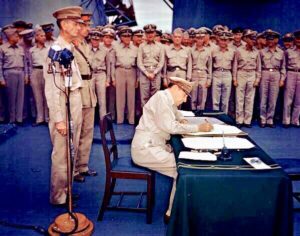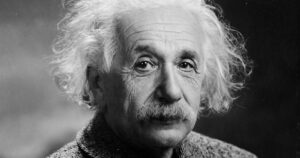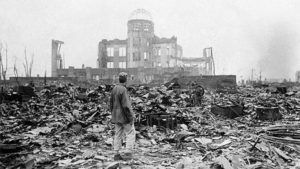All the men pictured here are now deceased, but the deed they performed 77 years ago in Tokyo Harbor will live forever.
The man at the table is signing his name to a document accepting the unconditional surrender of Japan in its war against the rest of the world. General of the Army Douglas MacArthur commanded our forces in the Pacific Theater of Operations.
The Japanese surrender marked the end of the bloodiest war in human history and, to my way of thinking, we need to mark this day in some official manner, the way we commemorate Veterans Day, or Memorial Day, or the Fourth of July.
***
I say this because I believe I have some skin in this game. I wasn’t there, of course. I would enter this world a little more than four years after Gen. MacArthur’s signature dried on the document.
My father, though, was serving in the Navy when the war ended. He was in the Philippines. Dad had served his time in hell in the Mediterranean theater, fighting the Germans and the Italians. He endured 105 consecutive days of aerial bombardment.
After all that, Dad was sent to the Philippines, I believe to prepare for the invasion of Japan. He’d already taken part in three amphibious landings: in North Africa, in Sicily and in Salerno, Italy. Dad was, shall we say, an experienced hand.
Then came one of the most fateful decisions in the history of the world. A new U.S. president, Harry Truman, was briefed on a weapon he didn’t know existed when he took office in April 1945 upon the death of President Roosevelt. The military brass told him the A-bomb could end the war immediately, and that it could save many more Japanese and American lives than would be lost if we dropped the bomb.
In August 1945, President Truman ordered two of these devices dropped on Japan. The enemy sued for peace five days after the second bomb exploded over Nagasaki.
Over the course of my career in journalism, I had several opportunities to speak to community groups. I spoke one day to a group of veterans at the Thomas Creek VA Medical Center in Amarillo. I spoke to the vets about political courage and specifically about the guts Truman showed in using those horrible weapons.
I received one standing ovation during my time speaking to community groups. I got one that day when I said, “May God bless President Truman.”
The way I figure it, President Truman likely might have saved Dad’s life when he ordered the bombs to fall on Japan and, thus, enabled me to enter this world.
So, you see, the surrender that Gen. MacArthur accepted that day aboard the USS Missouri is — to borrow a phrase — a big … deal.


